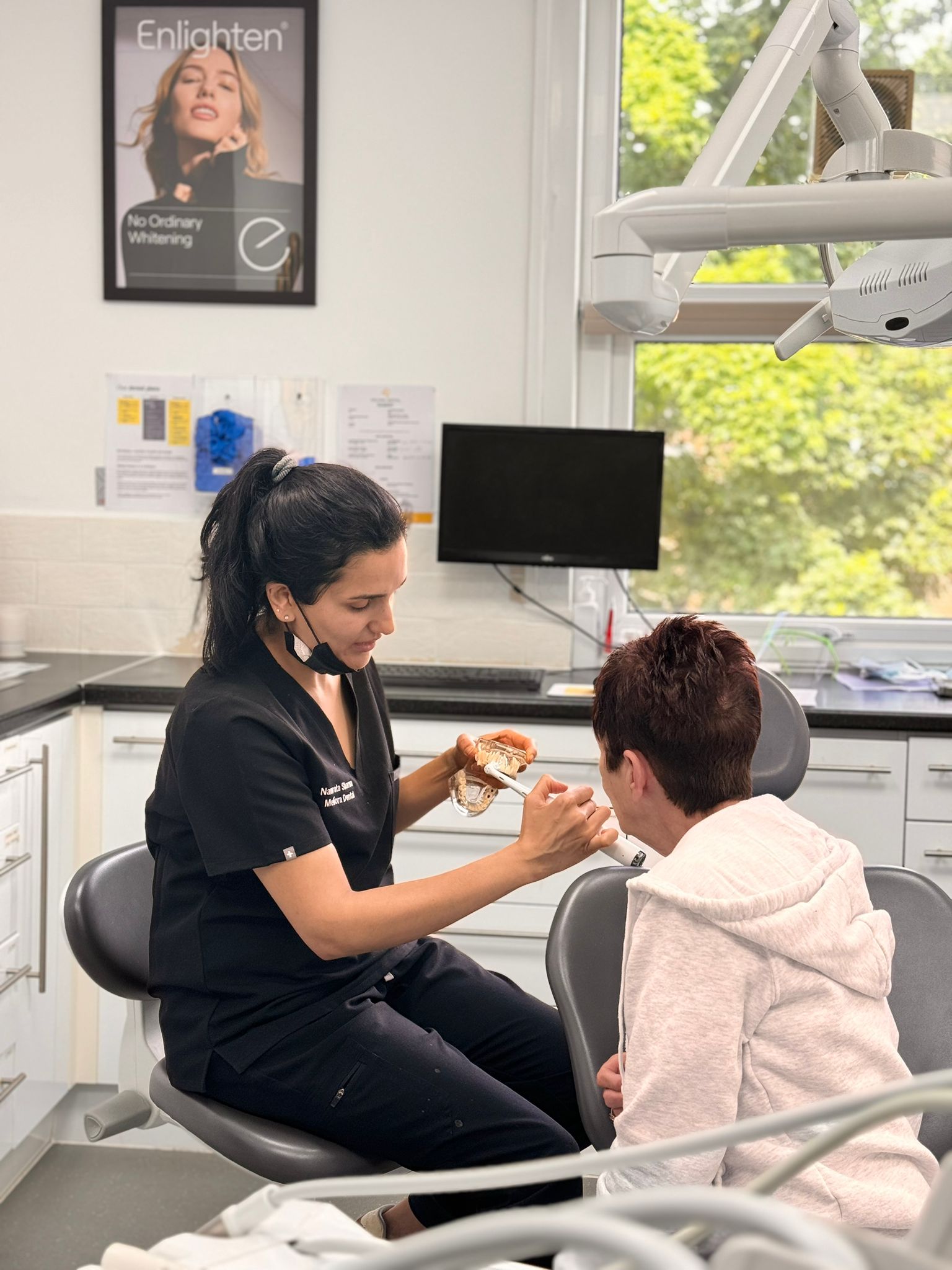Gum disease remains the main culprit for premature tooth loss in adult patients here in the UK. If you’re searching ‘gum disease treatment Leeds’ in Google and finding no joy, you’ve reached the right clinic by having landed on this blog.
Meliora Dental’s very own Dr Namrata Sharma is a dentist with a special interest in periodontics, who has amassed a wealth of experience and knowledge on how to treat individual cases of gum disease and prevent it in the future.
In this piece, she sheds light on the link between nutrition and gum health, and how she can use her periodontal experience and background in nutrition to benefit patients.

Dr Namrata. Threats are based on oxidative free radical reactions to the DNA. Certain foods increase the risk of this happening; fast food, refined carbohydrates, and foods with a high sugar content.
When gum disease begins to occur, oxidative stress induces damage to cellular components, proteins, DNA and lipids. However, the damage is not necessarily limited to your oral health. Once gum disease has caused a certain degree of oxidative stress, cardiovascular health can become affected. The link between gum disease and heart disease has been the topic of many recent studies over the past decade. It’s now becoming increasingly clear that the two are more closely interrelated than researchers first thought.
Research has found higher levels of a bacteria called Porphyromonas gingivalis (shortened to P gingivalis) in the mouth can cause damage to the heart. We also know from clinical studies that plaque which once existed in the mouth can enter the bloodstream and clog arteries, leading to an increased risk of heart attacks and angina.
With all of this in mind, consuming foods that don’t increase oxidative stress in the body is only going to be good news for lowering your risk of oral health-related issues, and wider health issues.
I frequently discuss health concerns and risks that are interlinked with their oral hygiene and am always happy to do so. Often, patients don’t realise how much their diet is affecting their oral health until we hone in on what they’ve been eating and how much of a certain food they are consuming each week. Small changes to your diet can make a mammoth difference to your long-term oral health, and one of my roles as a dentist with a special interest in periodontics is to identify these and to help my patients implement such changes.
Dr Namrata. Antioxidants help protect cells from DNA damage and reduce inflammation in the body. Along with antioxidants, vitamins C and D, and healthy fats are important to aid this protective effect. Vitamin C is essential for supporting the body’s healing processes and the formation of new and healthy tissues, such as those in the mouth. Meanwhile, vitamin D helps with the absorption of calcium, vital for healthy bone and tooth mineralisation.
Dr Namrata. It’s more of an indirect relationship that over time causes gum disease, just like any condition in the body. Your gums are pretty resilient, but they’re not invincible. When you consume food like refined carbs and high-sugar foods, you are creating an ideal environment for plaque to thrive. There are only so many acid attacks your mouth can take before something has to give. Acids break down your tooth enamel, making cavities a likelihood, but let’s explore the damage from another perspective.
Once plaque has lingered on your teeth for too long, a chain reaction of negative things can happen, including gum inflammation and bleeding gums. This is just the first stage of bad news for your gum line. Once gum disease has progressed, the underlying structures such as your jaw can begin to deteriorate as a result of bacteria reaching through what’s known as a periodontal pocket. These pockets form when your gums pull away from your teeth, and a bad diet, in combination with poor oral hygiene habits and overzealously brushing your teeth, can be responsible.
But it’s not all doom and gloom. We can perform treatment to reverse gum recession and to close your periodontal pockets. This will help to reduce your risk of gum disease, as long as healthy habits are observed in the future.
Dr Namrata. I’m pursuing periodontics and nutrition as my niche area. This means I will be able to provide advice that is even more detailed and tailored, benefitting my patients in the short and long term.
I have also been giving a presentation to doctors and medical professionals on perio-systemic and peri-nutrition at Hull York Medical School.
I am continually engaging in further training and learning the use of new and emerging technologies and bringing this knowledge into my practice as a dentist with a special interest in periodontics. I believe that to be a great dentist, you have to be willing to look ahead to the new, and crossover into digital dentistry when is clinically beneficial. We use a wide range of digital technology to diagnose gum disease cases and to obtain a precise and thorough understanding of every single thing that’s happening inside your mouth. I believe in leaving no stone unturned.

Ever since establishing Meliora Dental, the Meliora Dental team has been emphatic about delivering a personalised service to their valued patients.
The periodontal care and treatment you receive will be based on thorough investigations into your oral health, saving you time and stress on your way to achieving a healthy mouth.
We look forward to helping you step on the right path to a healthier mouth and giving you the information and guidance to unlock good nutritional and lifestyle habits. Contact our friendly reception team to book your initial consultation appointment with our clinical team.
BACK TO BLOG
